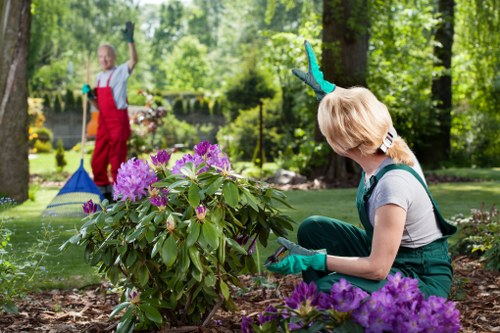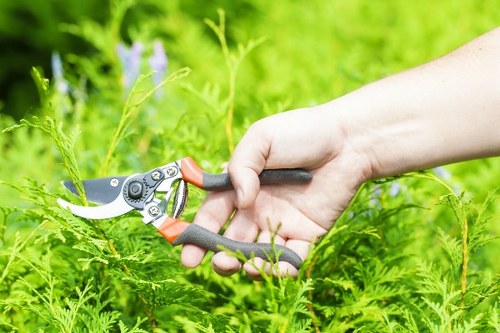Effective Driveway Algae Removal in Mill Hill

Algae growth on driveways is a common problem, especially in areas with high moisture and shade like Mill Hill. Not only does algae make your driveway look unsightly, but it can also lead to slipperiness, posing safety risks for you and your family.
Understanding the causes and effective removal methods is crucial for maintaining a clean and safe driveway. In this article, we will explore various strategies to combat algae growth and keep your driveway pristine.
Mill Hill’s climate, characterized by frequent rain and moisture, creates an ideal environment for algae to thrive. Addressing this issue promptly can prevent long-term damage and costly repairs.
Understanding Algae Growth on Driveways

Algae are simple plants that thrive in moist environments. On driveways, they often appear as green or black patches, especially on shaded areas where sunlight is limited.
The presence of algae indicates that your driveway retains moisture for extended periods. This can be due to poor drainage, inadequate sunlight, or the type of materials used in the driveway’s construction.
Ignoring algae growth can lead to deeper issues, including pavement deterioration and increased slipperiness when wet.
Common Causes of Algae on Driveways
Several factors contribute to algae growth on driveways:
- Moisture Retention: Persistent moisture provides the perfect breeding ground for algae.
- Shade: Areas with limited sunlight are more prone to algae growth.
- Poor Drainage: Water accumulation on the driveway surface encourages algae proliferation.
- Pavement Material: Some materials retain moisture longer, making them more susceptible to algae.

Effective Algae Removal Methods
1. Pressure Washing
Pressure washing is one of the most effective ways to remove algae from driveways. The high-pressure water jets can eliminate algae without damaging the pavement.
When performing pressure washing, ensure that the pressure is appropriate for your driveway material to avoid any potential damage.
Benefits of Pressure Washing:
- Quick and efficient removal of algae.
- Enhances the appearance of your driveway.
- Helps in maintaining the driveway’s integrity.
2. Algae Removal Cleaners
There are specialized algae removal cleaners available that can effectively kill and remove algae from your driveway.
These cleaners often contain acids or other chemicals that break down algae, making it easier to scrub away.
Using Algae Cleaners Safely:
- Follow the manufacturer’s instructions carefully.
- Wear protective gear to prevent skin and eye irritation.
- Rinse the area thoroughly after application to remove any chemical residues.

3. Vinegar and Baking Soda Solution
For a more eco-friendly approach, a mixture of vinegar and baking soda can be used to remove algae.
Vinegar acts as a natural disinfectant, while baking soda provides mild abrasiveness to scrub away the algae.
Steps to Use Vinegar and Baking Soda:
- Sprinkle baking soda over the affected area.
- Pour white vinegar evenly across the surface.
- Let the solution sit for 15-20 minutes.
- Scrub the driveway with a stiff brush.
- Rinse thoroughly with water.
4. Bleach Solution
A bleach solution can be an effective way to kill algae on driveways. However, it should be used with caution due to its strong chemical properties.
Mix one part bleach with ten parts water and apply it to the affected area. Allow it to sit for a short period before scrubbing and rinsing.
Safety Precautions:
- Wear gloves and protective eyewear.
- Ensure proper ventilation if using indoors.
- Avoid contact with plants and grass.

Preventing Algae Growth on Your Driveway
Prevention is always better than cure. Implementing the following measures can help prevent algae from returning to your driveway:
- Improve Drainage: Ensure that water does not pool on your driveway by grading it properly.
- Increase Sunlight Exposure: Trim surrounding vegetation to allow more sunlight to reach your driveway.
- Seal the Driveway: Applying a sealant can reduce moisture retention and protect against algae growth.
- Regular Cleaning: Keep your driveway clean by regularly sweeping and removing debris that can trap moisture.
Using Sealants
Sealants create a protective barrier on your driveway surface, preventing water from penetrating and reducing the chances of algae growth.
Choose a high-quality sealant suitable for your driveway material to ensure long-lasting protection.
Types of Sealants:
- Acrylic Sealants: Provide a glossy finish and are easy to apply.
- Epoxy Sealants: Offer superior durability and resistance to chemicals.
- Silicone Sealants: Highly resistant to UV rays and extreme temperatures.
Professional Algae Removal Services in Mill Hill
If DIY methods are not yielding the desired results, it might be time to call in the professionals. Professional driveway algae removal services in Mill Hill offer comprehensive solutions tailored to your specific needs.
Benefits of Hiring Professionals:
- Expertise and experience in effective algae removal.
- Access to specialized equipment and high-quality cleaning agents.
- Time and effort savings for homeowners.
- Long-term protection strategies to prevent future algae growth.
Additionally, professionals can assess your driveway’s condition and recommend appropriate sealing and maintenance plans to keep it algae-free.
Choosing the Right Service Provider
When selecting a driveway algae removal service in Mill Hill, consider the following factors:
- Reputation: Look for reviews and testimonials from previous customers.
- Experience: Ensure the company has a proven track record in algae removal.
- Pricing: Compare quotes to find a service that fits your budget.
- Guarantees: Opt for services that offer satisfaction guarantees or follow-up treatments if necessary.
Local Relevance: Nearby Areas to Mill Hill
Mill Hill is surrounded by several nearby areas that also experience similar algae issues on driveways due to the climate and environmental conditions. Addressing algae in these areas ensures a comprehensive approach to maintaining clean and safe driveways throughout the region.
1. Barnet
Located just north of Mill Hill, Barnet shares similar weather patterns, making algae removal crucial for homeowners.
2. Hendon
Hendon’s shaded driveways are prone to algae growth, requiring regular maintenance and effective removal strategies.
3. Edgware
Edgware experiences high moisture levels, making it essential to adopt preventive measures against algae.
4. Colindale
Colindale’s dense vegetation contributes to persistent algae issues, necessitating professional cleaning services.
5. Golders Green
Golders Green’s compact driveways can trap water, leading to algae proliferation if not properly managed.
6. Kingsbury
Kingsbury’s varied pavement materials require tailored algae removal techniques for effective maintenance.
7. Colney Hatch
Colney Hatch faces similar algae challenges, with many driveways benefiting from specialized removal services.
8. Friern Barnet
Friern Barnet’s climate conditions make algae prevention and removal a regular necessity for homeowners.
9. Burnt Oak
Burnt Oak’s moisture-rich environment supports algae growth, emphasizing the need for consistent driveway care.
10. Totteridge
Totteridge’s serene landscapes can sometimes obscure algae growth, making regular inspections important.
11. Whetstone
Whetstone’s driveways often require algae treatment to maintain their aesthetic appeal and safety.
12. West Finchley
West Finchley benefits from proactive algae removal practices to keep driveways clean and functional.
13. Colwyn Grove
Colwyn Grove’s residential areas require effective algae management to uphold property values.
14. East Barnet
East Barnet’s diverse driveway surfaces demand comprehensive algae removal solutions.
15. Friern Grove
Friern Grove’s community-focused environment prioritizes clean and safe driveways through regular algae maintenance.
Maintaining a Clean Driveway
Regular maintenance is key to preventing algae from taking hold on your driveway. By implementing the following practices, you can keep your driveway looking clean and safe throughout the year.
- Regular Cleaning: Sweep your driveway regularly to remove debris that can trap moisture.
- Inspect for Damage: Check for cracks or holes where water can accumulate and address them promptly.
- Trim Surrounding Plants: Keeping vegetation around your driveway in check allows more sunlight to reach the surface.
- Apply Sealant: Periodically reseal your driveway to maintain its protective barrier against moisture.
Seasonal Maintenance Tips
Different seasons present unique challenges for driveway maintenance. Adapting your maintenance routine can help manage algae growth effectively.
Spring:
- Remove winter debris and clean the driveway thoroughly.
- Inspect and repair any damage caused by harsh weather.
Summer:
- Trim plants to reduce shade and increase sunlight exposure.
- Apply sealant to reinforce protection against moisture.
Autumn:
- Clear fallen leaves and organic matter that can trap moisture.
- Conduct a deep cleaning to prepare for the wetter months.
Winter:
- Promptly remove snow and ice to prevent prolonged moisture exposure.
- Use safe de-icing agents that won’t degrade the driveway material.
Choosing the Right Driveway Material
The material of your driveway plays a significant role in algae growth and overall maintenance. Some materials are more resistant to moisture retention and algae proliferation than others.
Concrete Driveways
Concrete is a popular choice due to its durability and low maintenance needs. Sealed concrete driveways are particularly resistant to algae growth.
Asphalt Driveways
Asphalt can be prone to algae and moss in shaded areas. Regular sealing and maintenance can mitigate these issues.
Brick and Paver Driveways
Brick and paver driveways offer aesthetic appeal but require consistent cleaning to prevent algae buildup between the joints.
Gravel Driveways
Gravel allows for better drainage, reducing moisture retention. However, regular maintenance is necessary to keep the surface level and prevent algae growth.
Resin-Bound Driveways
Resin-bound driveways are permeable and less likely to retain moisture, making them a good option for preventing algae growth.
Factors to Consider When Choosing Driveway Material:
- Climate: Choose materials that perform well in Mill Hill’s humid and moist climate.
- Maintenance: Consider the level of maintenance required to keep the driveway algae-free.
- Aesthetic Preferences: Select materials that complement the architectural style of your home.
- Budget: Balance initial costs with long-term maintenance expenses.
Conclusion
Driveway algae removal in Mill Hill is essential for maintaining both the appearance and safety of your property. By understanding the causes of algae growth and implementing effective removal and prevention strategies, you can ensure a clean and durable driveway.
Whether you choose to tackle the problem yourself or hire professional services, regular maintenance and the right materials will keep algae at bay, enhancing the curb appeal and longevity of your driveway.
Frequently Asked Questions
1. How often should I clean my driveway to prevent algae growth?
Regular cleaning is recommended at least twice a year, preferably in spring and autumn. Additionally, removing debris and maintaining proper drainage can help prevent algae from taking hold.
2. Can I use natural remedies to remove algae from my driveway?
Yes, natural remedies like vinegar and baking soda solutions are effective and eco-friendly options for algae removal. They are safer for the environment and your driveway compared to harsh chemicals.
3. What are the best materials for preventing algae growth on driveways?
Materials that offer good drainage and reduce moisture retention, such as sealed concrete, resin-bound, and gravel driveways, are ideal for preventing algae growth.
4. Is it necessary to hire professionals for algae removal?
While DIY methods can be effective, hiring professionals ensures thorough removal and long-term prevention. Professionals have access to specialized equipment and expertise to handle severe algae infestations.
5. How can I prevent algae from returning after removal?
Implement preventive measures such as improving drainage, increasing sunlight exposure, regularly cleaning the driveway, and applying a sealant to reduce moisture retention and discourage algae growth.
Frequently Asked Questions
Learn effective strategies for driveway algae removal in Mill Hill, including causes, removal methods, prevention tips, and local service options to keep your driveway clean and safe.
Get A QuoteWhat Our Customers Say





 (10)
(10)
Get In Touch With Us.
Please fill out the form and we will get back to you as soon as possible.
